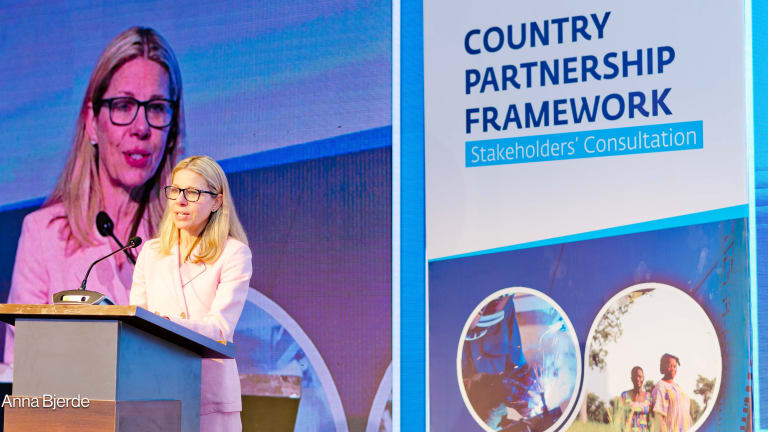Ericsson’s nonphilanthropic approach to corporate responsibility

Ericsson has a “long history of working with sustainability even before it was popular” — a factor that could be partially attributed to its base in Stockholm, Sweden, and the Nordic culture that encourages sustainability awareness, says Elaine Weidman-Grunewald, the telecommunications company’s vice president of sustainability and corporate responsibility.
Ericsson has implemented mobile broadband and cloud solutions in schools under the Millennium Villages initiative in sub-Saharan Africa — and to help develop a mobile application that can allow refugees to reunite.
More than 6.3 billion people in the world now have mobile subscriptions, Ericsson’s CEO Hans Vestberg told a side-panel forum Saturday afternoon at the Social Good Summit, in uptown Manhattan.
“The more people getting access [to mobile phones and Internet] in countries, the more important it is going to be for the sharing of information,” Vestberg explained to Devex. “It’s about getting more and more people thinking about this.”
Weidman-Grunewald spoke more in-depth with Devex about the history behind Ericsson’s corporate sustainability and corporate responsibility plan, why it matters, and why it’s different from philanthropy.
What do you think made it possible for Ericsson to move to where it is now in terms of your corporate social platform and work?
I think one of the things that I have been focused on setting the strategy for this area is really the use of the core business … our very nonphilanthropic type of approach. So really looking at the technology and the competence that we have as a company and focusing more on the use of that. … It’s more, “What do we stand for?” and “What can we really … do with our core purpose of being as a company?” That’s really been the strategy we’ve been working on.
Connecting your work in a way that makes sense?
You can look around the world — you have orphanages, you have so many causes, but we think, what can our technology do? So we work with education, cloud-computing technology … or it could be we work a lot with refugees. But we’re not giving money to the refugee cause. We developed the mobile platform so people can search and find each other using cell phones. So it’s about, what do we offer? What’s our value proposition to the sustainability area?
And was that your idea from the start?
No, I’d say more over the last couple of years. [It became very obvious] when we started to work with the Millennium Development Goals more actively [in 2007]. We were in this project with the Millennium Villages and [we asked ourselves] what are we going to do here, you know, how are we going to use the technology? And I think that was kind of the start of the journey for us to focus more on what we bring to the table.
When you think now about the next five to 10 years moving forward, past the MDGs, what do you want Ericsson to become more involved with, how do you see your social platform developing?
I think the MDGs were a lot about poverty and the poorest of the poor, and I think a lot of progress has been made — arguably a lot more to be done — but I think also we can’t forget about urbanization, even in the developed world. So I think the MDGs were very globally important, they mobilized the international community around these topics, but I think now going forward it’s much more talk about SDGs, Sustainable Development Goals. So I think environment will become more important … [our social platform is] going to be a little bit broader. That’s how we’re looking at it.
And when you think about our companies and you see other companies trying to develop their own agenda in this way that Ericsson has done, what do you think they should be thinking about if they want to be successful in this work and they want it to make sense?
Every person and every company comes from a different perspective and a different environment and I think, whatever, if you work in the auto industry, or the oil and gas, you should think about, “What is my product, what do I bring to the discussion?” And focus on that. Because that’s where you can have an effect. There’s no point for me in telecom to talk about oil and gas … Where you can have an effect is what you should focus on.
Do you see that happening for the most part, that companies are focusing on what they should be focusing on, or is there not enough of that still?
It’s rare. I don’t think it’s penetrated. I think that’s the future, where it needs to go … It’s pretty obvious but I think there’s a lot of, in the sustainability area, a lot of roots around philanthropy and you don’t get that connection. … But if you are a global company I think you can do more.
Stay tuned for more coverage from this year’s Social Good Summit, and check out our conversations with other global development luminaries attending the event.
Search for articles
Most Read
- 1
- 2
- 3
- 4
- 5








